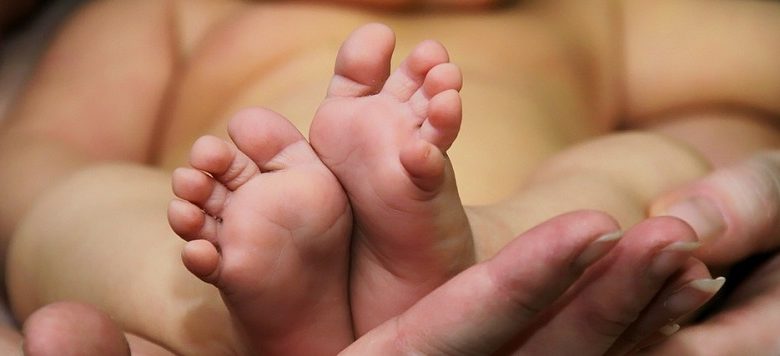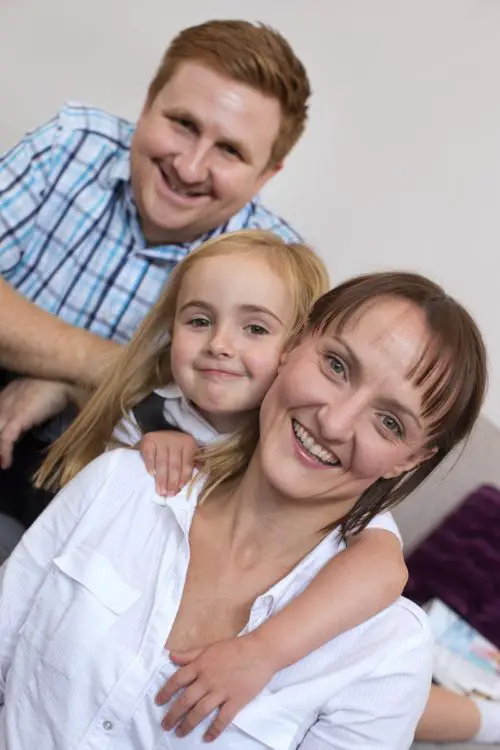
Accepting disability and becoming a disabled parent
Being a parent is never easy, let alone if you have a disability to contend with as well. But that hasn’t stopped Rebecca Brown. She has suffered from cardiomyopathy and kidney failure, and just after giving birth, she was diagnosed with Muscular Dystrophy. It wasn’t easy, but she’s incredibly proud of how her daughter has developed, in part, because of her disability.
I would describe myself as a mum, wife, advocacy officer for Muscular Dystrophy UK and, lastly, disabled.
The first experience I had of what it is like to be disabled was at the age of 15 when I was diagnosed with cardiomyopathy. This is essentially where the heart muscle becomes stretched, thickened or stiff, and so struggles to pump blood around the body.
A few months of being breathless, exhausted and unable to do anything for myself really taught me a lot about life and I grew up very quickly. Thankfully, I was amazingly lucky to receive a successful heart transplant in time, which saved my life.
Nine years later, after again becoming extremely unwell and unbelievably fatigued, I was told my kidney was failing. I was very fortunate, once again, to have a kidney transplant swiftly, this time from my mother, after only being on dialysis for a few months. After about a year I recovered my health and returned to university and working part-time.
Living life to the full
These early experiences meant I was determined to make the most out of life. I met my now husband on a night out and we just got on really well. We got engaged in 2010 and planned to get married the following year.
He was understanding of the issues I had faced with the transplants and supportive of the fact that having children was unlikely to be straightforward for me.
Deciding to become a parent
Because of my heart and kidney problems, when it came time to start our family, we took advice from the medics involved in my care. Although we knew it was going to be risky, we were determined to proceed.
There are very few women who have successfully had a baby after two transplants. Those who have are put on different medications and face a variety of other problems. I was told there was a risk of preeclampsia, early labour, heart or kidney rejection, heart failure and infection.
I was very closely monitored and I had an ultrasound of the baby most weeks, and blood tests to see how my body was holding up. I think I gave everyone, including the doctors involved, several grey hairs with worry.
It was in no way easy, and there were several ups and downs throughout my pregnancy. Also, towards the end of my pregnancy, I had become tired and had a couple of falls, but didn’t think anything of it at the time. I had no idea that I might have Muscular Dystrophy.
Despite the issues, I managed to cope and get to 37 weeks. Although the birth was slightly early, I had a healthy baby girl who was a good weight. It was time to enjoy being a mum.
If being a new mum wasn’t busy enough, I had also taken my dream job as a healthcare assistant, which I would be starting after my maternity leave, and enrolled to start my nurses training the following year.
Discovering I had Muscular Dystrophy
I had started to notice that I couldn’t get up off the floor from playing with my daughter without having to lean on a chair. I also seemed to be falling really easily. So, I went to the GP, thinking it would be because of being tired with a new baby and perhaps needing to get some physio to strengthen up again.
However, after seeing several doctors and having many investigations, I was diagnosed with Muscular Dystrophy. I was devastated but life goes on and I was determined to create a good life for my family.
Being a disabled parent
I can walk, so don’t use a wheelchair, but I have weakness in my hips and upper arms. This massively affected how much I could look after my child. As my daughter grew and gained weight, it became more obvious that I couldn’t lift her, or carry her upstairs for a nap. It meant I had to take someone with me if we went out.
I also had to change my career as I was struggling with the physical demands of nursing. But, I was very fortunate to still be able to have contact with and support patients as an advocacy officer for Muscular Dystrophy UK, which I started in 2016.
It’s been frustrating and, on occasions, upsetting. Upon realising that I couldn’t run or play with her in the park, I went through a period of grieving. I felt that I had let my baby down by not being ‘normal’. But my husband and family have been amazing and incredibly supportive.
So I decided that I needed to start being creative – like so many other disabled people I have met – and find ways of doing things and looking after her. So, she napped on a mattress in the lounge instead of upstairs. I cuddled her sat down and other people carried her for me up and down the stairs. We did it our way.
I realised, I am her normal. She doesn’t know the ‘right’ way to do things. She was a baby simply wanted me there with my love and attention. Once I realised this, I stopped being so hard on myself!

Being who she is because of my disability
I won’t deny that it’s been hard at times. It was particularly hard when she was a toddler and would run off or want to play, but I couldn’t keep up. However, I think any parent will tell you that toddlers are difficult!
She is now 6 and has developed to be an empathetic and very independent little girl. I believe that this is, in part, because of my disability. I still find it hard to accept my disability and to tell people about it, but she is fantastic about it. It’s normal to her. I am so amazingly proud of how she just accepts things.
This summer we were out with friends at a local park and one of the little boys wanted me to push him on the swing while his mum was feeding his baby brother. Without me having to say a word, my daughter ran over and said; “I will push you my mum has bad legs”. It was just a beautiful moment.
She has, in turn, made me more accepting of my limitations. She also makes me challenge my expectations of what I can do and achieve by thinking differently. I used to be unwilling to ask for help, but this has changed because of her. We all need some support sometimes, whoever we are. My daughter has made me realise that.
To all the disabled parents out there, keep doing it your way, you are amazingly adaptive and resilient, and so are your children.
By Rebecca Brown
Get in touch by messaging us on Facebook, tweeting us @DHorizons, emailing us at editor@disabilityhorizons.com or leaving your comments below.
https://disabilityhorizonscom.onyx-sites.io/2017/01/being-a-disabled-parent-unlocking-your-heart/
https://disabilityhorizonscom.onyx-sites.io/2014/07/disability-and-parenting-how-possible-is-it/